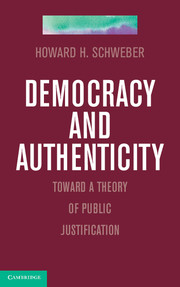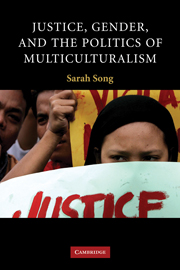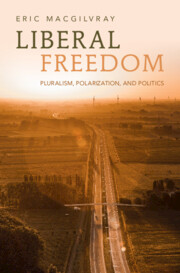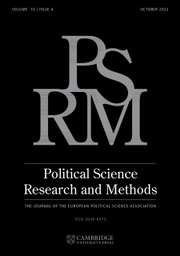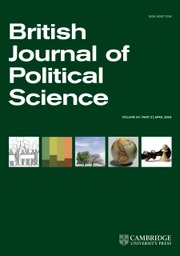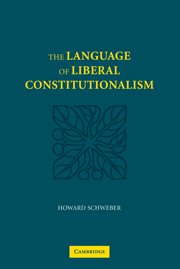Democracy and Authenticity
Toward a Theory of Public Justification
$108.00 (C)
- Author: Howard H. Schweber, University of Wisconsin, Madison
- Date Published: October 2011
- availability: Available
- format: Hardback
- isbn: 9781107015333
$
108.00
(C)
Hardback
Other available formats:
Paperback, eBook
Looking for an examination copy?
This title is not currently available for examination. However, if you are interested in the title for your course we can consider offering an examination copy. To register your interest please contact [email protected] providing details of the course you are teaching.
-
In Democracy and Authenticity Professor Howard Schweber examines a basic problem for liberal democracies. When a political entity is characterized by a multitude of identities and values, certain constraints apply to reasons for citizens and public officials to justify coercive political actions. The author argues that justifications based on particular religious doctrines are not a proper basis for government actions that affect everyone. He then develops a concept of public justification intended to guide citizens in a liberal democracy through the work of creating policies that satisfy their responsibilities to one another.
Read more- Contains a thorough review of the current literature on liberalism and its critiques
- Presents a more developed and more specific model than other works in the field
- Challenges the dominance in the political theoretical literature of the past decade by theorists who treat liberal pluralist democracy as a dead letter
Reviews & endorsements
“In this sensible and carefully-reasoned book, Howard Schweber tackles the central question of liberal political theory: how to justify state action in the face of an abiding and often quite unreasonable pluralism. Schweber’s knowledge of contemporary debates is near-encyclopedic, and his dissection of the theoretical underpinnings of all major schools of deliberative democracy is compelling. His alternative of a ‘listener-centric’ theory of public justification proves a useful corrective to competing theories that end up, on closer examination, being either unduly inclusive or restrictive. In Democracy and Authenticity, Schweber has crafted a challenging new theory of deliberative democracy that political philosophers, constitutional scholars, and defenders of the politics of authenticity will have to take seriously.”
– Richard Boyd, Associate Professor of Government, Georgetown UniversitySee more reviews“Professor Schweber has written an exceptionally erudite study of justification in a liberal culture. His assertion that liberalism often requires a certain inauthenticity is original, fascinating, and a challenge to much contemporary orthodoxy.”
– Mark Graber, Professor of Law and Government, University of Maryland, Carey School of Law“Tribalism is not an arcane premodern phenomenon but rather a trait to be found in democracies as different as those of Pakistan, Israel, and the United States, notes Howard Schweber. Defending liberal concerns about the deleterious impact of tribalism on politics, Schweber treats likely critics and allies with equal seriousness as he makes the case for practices of public justification (not public reason) that are neither subjectivist nor perfectionist. Even those of us who have argued against treating justification as the essential work of political theory will be compelled to reconsider after reading this ambitious and fair-minded book.”
– Bonnie Honig, author of Emergency Politics: Paradox, Law, Democracy“A fierce defense of liberalism. Schweber warns against the politics of authenticity and accommodations of pluralism that go too far.”
– Robert L. Tsai, Professor of Law, American University, and author of Eloquence and Reason"Interrogating scores of contemporary texts in liberal-democratic theory, Schweber finds most of them contaminated by commitments to authenticity--a lingering "atavistic attachement" connecting political life to deeply held identities and beliefs, especially religious, ethnocentric, and patriotic... A forensically erudite and vigorous academic performance. Summing Up: Highly recommended." -E.J. Eisenach, emeritus, University of Tulsa, CHOICE Magazine
Customer reviews
Not yet reviewed
Be the first to review
Review was not posted due to profanity
×Product details
- Date Published: October 2011
- format: Hardback
- isbn: 9781107015333
- length: 446 pages
- dimensions: 234 x 161 x 28 mm
- weight: 0.72kg
- availability: Available
Table of Contents
Introduction: consensus liberalism and the challenge of pluralism
Part I. The Case for Constraint:
1. Three cases for constraint: Audi, Rawls, and Larmore
2. Subjective standards and the problem of deliberative perfectionism
3. Liberalism and the problem of authenticity
4. Further reflections on authenticity
5. The scope of constraint
Part II. Responding to the Case for Inclusion:
6. Arguments from consequences: pluralism and the role of culture
7. The arguments from consequences: agnostic democracy and republican virtue
8. Fairness as equality
9. Fairness as recognition
10. The argument from epistemology: claims of equivalence
11. Empiricism and public justification
12. Toward a theory of public justification.
Sorry, this resource is locked
Please register or sign in to request access. If you are having problems accessing these resources please email [email protected]
Register Sign in» Proceed
You are now leaving the Cambridge University Press website. Your eBook purchase and download will be completed by our partner www.ebooks.com. Please see the permission section of the www.ebooks.com catalogue page for details of the print & copy limits on our eBooks.
Continue ×Are you sure you want to delete your account?
This cannot be undone.
Thank you for your feedback which will help us improve our service.
If you requested a response, we will make sure to get back to you shortly.
×
